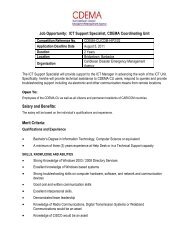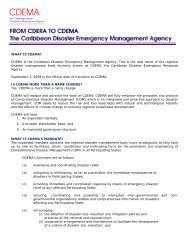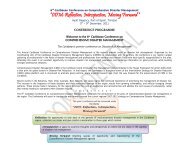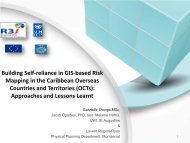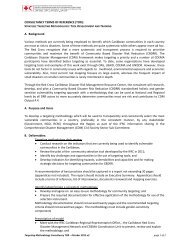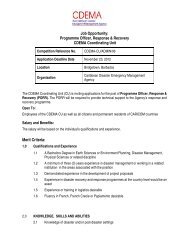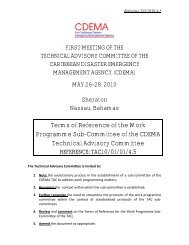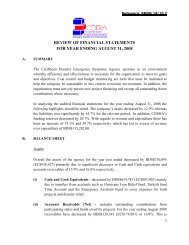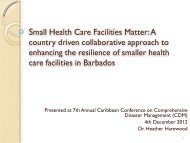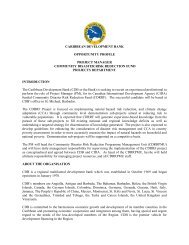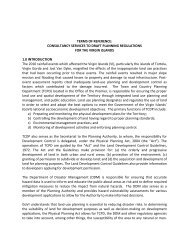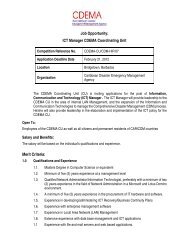You also want an ePaper? Increase the reach of your titles
YUMPU automatically turns print PDFs into web optimized ePapers that Google loves.
disaster risk reduction and reduction or reversal of damage to and loss of natural resources. CANARI is<br />
increasingly adopting and training others in outcome mapping, which tracks the impact of project interventions<br />
on people’s behaviour and actions, and will therefore introduce this concept briefly in the M&E Section of the<br />
Module alongside the more traditional monitoring and evaluation of whether project outputs have been<br />
achieved.<br />
3.2.2 Good practice in DRR Climate Change Training and Capacity Building<br />
Based on the review of selected community-based disaster management and climate change materials (tool<br />
kits, training manuals and videos) listed in Appendix 2, as well as CANARI’s own experience in delivering<br />
training and capacity-building workshops, the following elements of good practice in training and pedagogy<br />
have been identified as methods and practices that will be used to inform the development of the <strong>CDEMA</strong><br />
climate change module.<br />
a) Use of a range of teaching/training methodologies<br />
Each person learns in a different way, and using a range of training methods in a workshop setting<br />
accommodates this. Additionally, the use of a various methodologies breaks up the monotony of a training<br />
course and engages participants in different ways (see, for example, Concern Universal 5 ; and Coburn et al./UN<br />
Disaster Management Training Programme). Each methodology used has its particular strength and utility in a<br />
workshop setting.<br />
Icebreakers and energisers encourage rapid relationship building and stimulate participants at points in<br />
the workshop where their energy has dropped.<br />
Lectures, presentations and background reading are useful for conveying knowledge.<br />
Whole group discussions allow for the development of a common understanding of certain topics and<br />
identify areas where there may be conflict within the group or community.<br />
Small group discussions stimulate greater participation from people who are not confident contributing<br />
to large group discussions;<br />
Questioning techniques promote participant engagement and help to identify participants’ relevant prior<br />
knowledge and experience.<br />
Brainstorming allows participants to generate several ideas about an issue in a short space of time<br />
without others criticising them.<br />
Small group work and practical exercises involve participants as actors and allow them to apply<br />
information and knowledge gained to their own situation for problem solving.<br />
b) Use of Participatory Learning Action (PLA) Tools<br />
Participatory learning and action (PLA) tools are particularly useful for community level engagement because<br />
they allow not only for information and idea generation but also create space within a training setting for<br />
analysis and learning by local people. PLA tools build participation and support communication and conflict<br />
resolution, all of which have usefulness outside the workshop setting.<br />
Several disaster preparedness manuals incorporate the use of PLA tools (see material by International<br />
Federation of Red Cross and Red Crescent Societies; WWF; Daze et al./CARE International; Abarquez, et<br />
al./Asian Disaster Preparedness Center; Bread for All;<br />
for example).<br />
c) Inclusion of illustrations of tools:<br />
The use of illustrations (diagrams and photos) of tools described in training material provides an additional<br />
visual support for facilitators. This is particularly useful for facilitators who may not have used a particular tool<br />
before.<br />
5 All materials referenced here are listed in more detail in Appendix 2.<br />
6



